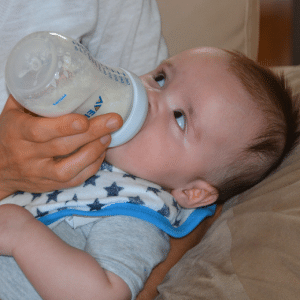
A federal judge, on July 17, ruled that a mother may seek punitive damages in her necrotizing enterocolitis (NEC) lawsuit against Abbott Laboratories.
The lawsuit, which has been consolidated into a multidistrict litigation in the Northern District of Illinois being overseen by U.S. District Judge Rebecca R. Pallmeyer, alleges that the plaintiff’s infant developed NEC after being fed Similac and/or Enfamil products. The lawsuit seeks to recover compensation for the infant’s NEC diagnosis. The lawsuit also seeks to recover punitive damages.
Punitive damages are a rather rare award in civil lawsuits. They are intended to punish defendants for egregious conduct and deter others from behaving in the same way.
Abbott had argued that the plaintiff’s complaint didn’t satisfy the standard necessary to seek punitive damages. However, judge Pallmeyer disagreed, finding the claims outlined in the lawsuit are sufficient to allow the plaintiff to go forward with seeking punitive damages.
Judge Rules Plaintiff’s Allegations Meet Standard To Seek Punitive Damages
Judge Pallmeyer noted that because the NEC lawsuit originated in Maryland, Maryland’s laws regarding seeking punitive damages apply to the case.
The judge’s ruling notes that under Maryland law, punitive damages are usually reserved for punishment of “the most heinous” of defendants “whose conduct is characterized by evil motive, intent to injure, or fraud.”
The judge refers to Owens-Illinois v. Zenobia as “the lead case” regarding punitive damages being awarded in product liability claims in Maryland. In that case, the Maryland court found that it isn’t likely that product manufacturers or suppliers specifically intend to hurt consumers. So, to overcome this, the Maryland court in Zenobia found that plaintiffs alleging malice in product liability cases must demonstrate that:
- The defendant knew about a product defect
- The defendant deliberately or consciously disregarded the harm the defect could cause
Judge Pallmeyer ruled that the plaintiff’s complaint meets the above standards.
Judge Rules Complaint Alleges Actual Knowledge Of A Product Defect
Judge Pallmeyer ruled that the plaintiff’s complaint alleges that Abbott knew that its infant formula products were defective because they can cause NEC.
The judge’s ruling notes that the plaintiff’s complaint claims Abbott knew or should have known its product could cause NEC from multiple information sources, including:
- A 1990 study finding that some babies who are fed only formula are 20 times more likely to develop NEC
- Numerous studies from 2010 to 2015 finding that premature infants who are fed cow’s milk products have a significantly higher chance of developing NEC necessitating surgery when compared to infants fed human milk
- A 2011 U.S. Surgeon General report which stated that formula feeding has been found to be associated with higher NEC rates when compared to infants who aren’t fed formula
- An American Academy of Pediatrics statement which recommended that premature infants only be fed human milk because of the NEC risk associated with cow’s milk products
The judge notes that, assuming these allegations are true, the plaintiff’s complaint plausibly alleges that Abbott knew that its preterm infant nutrition products could cause NEC.
Judge Rules Complaint Alleges That Abbott Labs Disregarded Their Products’ NEC Risk
Judge Pallmeyer ruled that the plaintiff’s complaint claims that Abbott deliberately and consciously disregarded the NEC risk associated with their products. The ruling notes that the plaintiff’s complaint claims that Abbot “specifically marketed” their products as necessary for the development and growth of preterm babies, when, in reality, the products pose substantial, known risks to preterm infants.
The ruling notes that the plaintiff’s complaint claims that Abbott “deliberately” promoted their products by “intentionally” encouraging healthcare providers to feed preterm infants their products rather than developing safety plans to protect infants from NEC.”
The ruling notes the complaint alleges Abbott claimed their products helped premature infants grow despite knowing the products were causing infants to develop NEC and die, and alleges that Abbott promoted its products in spite of evidence that products containing human milk are safer since Abbott lacked products containing human milk to sell.
NEC Lawsuits Allege Similac, Enfamil Can Cause NEC
The lawsuit is one of many in the NEC multidistrict litigation alleging that Similac and Enfamil products can cause premature infants to develop NEC.
The lawsuits present evidence in the form of scientific studies and statements from medical organizations.
One study cited in the lawsuits is a 1990 study which found that:
- NEC is six to ten more likely to develop in babies only fed formula compared to babies only fed breast milk
- NEC is three times more likely to develop in babies who are fed formula and breast milk compared to babies only fed breast milk
- NEC is rare in babies born at over 30 weeks gestation who are fed at least some breast milk, but is 20 times more likely to develop in these babies who are only fed formula
A 2009 study cited in the lawsuits found that premature infants fed only human milk are 90 percent less likely to end up with NEC necessitating surgery compared to premature infants who are fed at least some cow’s milk products.
The lawsuits note that a 2011 Surgeon General’s report, “The Surgeon General’s Call to Action to Support Breastfeeding,” warns that formula is associated with an increased risk of premature infants developing NEC, noting that premature babies who are not fed breast milk are 138 percent more likely to end up with NEC.
The lawsuits note that a 2011 study found that premature infants given cow’s milk products have a significantly higher risk of developing NEC necessitating surgery. The study supports feeding extremely preterm infants exclusively human milk.
The lawsuits note that a 2012 American Academy of Pediatrics statement, Breastfeeding and the Use of Human Milk, advocates for feeding premature infants only human milk because of the NEC risk associated with cow’s milk products. The statement suggests that when a mother’s own milk is not available, premature infants should be fed pasteurized donor milk.
The lawsuits mention a 2014 study which mentioned that “it is well established” that the risk of NEC is increased by infant formula and decreased by breast milk. The study mentioned that exclusively feeding preterm infants breast milk significantly decreases their risk of developing NEC.
The lawsuits mention a 2017 study which compared the results of two clinical trials. The study found that cow’s milk products significantly increase preterm infants’ chances of developing NEC and dying.
The lawsuits allege that Similac and Enfamil have been marketed as equally safe as breast milk, and have been specifically marketed as safe for preterm infants.
The lawsuits claim that preterm formula makers have used similar tactics to tobacco manufacturers “by trying to ‘hook’ moms when they are most vulnerable.” These tactics, the lawsuits claim, include giving mothers in hospitals “gift baskets” containing free formula and coupons.
The lawsuits note that in 2000, the Director of the World Health Organization said that “the campaign against bottle-feed advertising is unbelievably more important than the fight against smoking advertisement.”
The lawsuits seek to recover financial compensation based on multiple causes of action, such as strict liability: design defect, strict liability: failure to warn, and negligence.
NEC Lawyers
 If your infant developed NEC after being fed Similac or Enfamil products, you may be entitled to financial compensation for medical bills, lost wages, pain, suffering, wrongful death and more.
If your infant developed NEC after being fed Similac or Enfamil products, you may be entitled to financial compensation for medical bills, lost wages, pain, suffering, wrongful death and more.
We represent clients on a contingency fee basis, meaning we don’t charge legal fees until and unless we obtain a financial recovery. Thus, the only fee you will ever owe us is a percentage of any money we recover for you. If we don’t recover any money for you, you owe us nothing.
We have been representing clients in product liability lawsuits for over 30 years. We have recovered over $750,000,000 for our clients in that time.
Call us today for a free consultation. You can click here to read more about NEC lawsuits.

